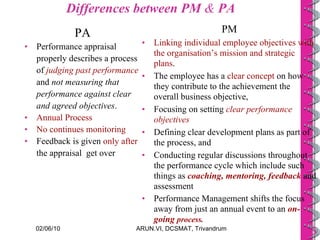Performance Management System & Performance Appraisal
- 1. Performance management system & Performance Appraisal Presented By, Arun V.I
- 2. PMS Moving from Traditional way of PA Performance management system ( systematic approach towards improving individual and team performance in the organisation) Strategic functions ( Resource planning, organisational development) Transactional functions (like to recruitment, selection, training etc..)
- 3. Performance appraisal system It is the process used to evaluate or measure an individual performance . Also helps in finding how effective the firm has been at hiring and placing an employee. It helps in categorizing the performing and non performing candidates. Employees who are less performing can be given adequate training.
- 4. Performance appraisal system contd.. Employees who are top performers can be rewarded on a monthly or quarterly basis. Personal development of the employee wherein the employees must be able to see some benefits to themselves from the appraisal system.
- 5. Differences between PM & PA PA Performance appraisal properly describes a process of judging past performance and not measuring that performance against clear and agreed objectives . Annual Process No continues monitoring Feedback is given only after the appraisal get over PM Linking individual employee objectives with the organisation’s mission and strategic plans . The employee has a clear concept on how they contribute to the achievement the overall business objective, Focusing on setting clear performance objectives Defining clear development plans as part of the process, and Conducting regular discussions throughout the performance cycle which include such things as coaching, mentoring, feedback and assessment Performance Management shifts the focus away from just an annual event to an on-going process.
- 6. Difference between PM & PA Performance Diary Notes Performance Management End of Year Start of Year Face To Face Planning Set Objectives Set Development Plan Competency Review Interim Review Work Effort Work Effort Final Review Work effort Start of the year End of the Year Review Performance Appraisal
- 7. Out comes PA Misdirected Bonuses Too Painful, Emotionally Charged Poor Understanding of Expectations Bad Timing Subjective Manager Opinion Performance Not Aligned to Promotions Poor Development Opportunities No Consequence For Non-Participation PM Communication Improves Everyone Knows the Rules Better Recording Opens Up Communication Frequent Communication Reduces Stress Appraisals Become Relevant for Everyone Employee Learning and Development Starts to Happen
- 9. Performance management system Performance management system Performance measurement Performance standards Reporting of Progress Quality improvement process Refine indicators and define measures Develop data systems Collect data Use data for decisions to improve policies programs and out comes Manage changes Create a learning organisation Analyze the data Feed data back to managers , staff, policy makers and constituents Develop a regular reporting cycle Identify relevant standards Select goals and targets Communicate expectations
- 10. Performance Management System It is the process of goal setting and measuring/evaluating the performance. It facilitates career planning ,clarity of performance goal & direction etc. It helps to provide feedback to individuals on their performance levels. It helps to generate data for decisions on salary, bonus and promotions.
- 12. Importance of performance management system It helps to counsel and coach subordinates so that they improve their performance and develop competencies. It motivates subordinates through recognition and support . To strengthen supervisor subordinate relations. It helps to define the training requirements based on individual competency. To analyse individual and organizational competencies , so that actions can be taken on problem areas.
- 13. Comprehensive Performance management Implementation Model
- 14. Effective performance management systems comprises..
- 15. Effective performance management systems comprises.. Forecasts • Projections and targets focused on specific business objectives normally over a 3-12 month timeframe Plans The road maps by which we aim to achieve the business objectives • Often a series of detailed actions which will enable us to achieve the required performance levels • Normally a daily / weekly / monthly timeframe
- 16. Effective performance management systems comprises.. Contd. Controls • By constantly reviewing the achieved level of performance against plan and the understanding the root cause reasons for variances we can positively influence performance Report • Effective reports deliver key management information to the relevant decision makers in a timely manner. • They facilitate informed decision making and allow managers to understand the effectiveness of actions taken in a previous period • Problems are highlighted and remedial actions are initiated
- 17. Thank you All

















